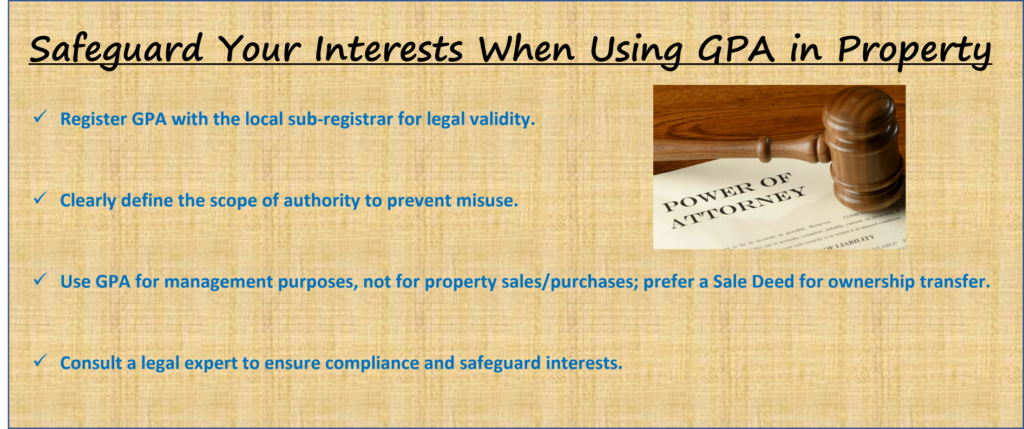What is GPA in Property? Understanding the Concept and Its Importance
When it comes to property transactions, particularly in India, the term GPA often arises. But what is GPA in property? The GPA full form in property is General Power of Attorney. It refers to a legal document that allows one person, known as the Principal, to authorise another person, the GPA holder, to carry out specific actions on their behalf regarding property matters. This blog will explore how the GPA power of attorney works, its significance, and the legal challenges associated with it, especially in property dealings.
What is GPA in Property?
In real estate, GPA stands for General Power of Attorney. It is a legal instrument that grants authority to one person to act on behalf of another, especially in property-related transactions. While the GPA power of attorney does not transfer ownership or title of the property, it allows the agent to manage the property, collect rent, pay bills, and even sell or lease the property if such powers are explicitly mentioned in the document.
However, it’s important to note that GPA does not substitute for a sale deed or property registration. It only authorises the GPA holder to act in place of the property owner but does not confer any ownership rights.
Read More: Property Settlement in India: Processes, Legal Aspects, and Recent Developments
How GPA Works in Property Transactions
The General Power of Attorney (GPA) is often used when the actual property owner is unavailable to manage the property themselves. For example, if a Non-Resident Indian (NRI) owns property in India but cannot personally handle matters related to it, they may appoint a relative or trusted person as a GPA holder. This person would then be able to perform tasks such as renting out the property, collecting dues, or even entering into a sale agreement on the owner’s behalf.
Although GPA power of attorney is commonly used in property transactions, it’s not equivalent to a transfer of ownership. The actual sale or transfer of a property title must be carried out through a registered sale deed.

Importance of GPA in Property Deals
A GPA can be a convenient tool for property owners who cannot be physically present to manage their real estate. It is particularly useful in the case of NRIs, elderly individuals, or those involved in multiple real estate transactions. Through GPA, they can assign someone trustworthy to manage and represent their property interests.
However, due to the lack of clear ownership transfer through GPA, this tool can also become a gateway to misuse, which is why it’s crucial to understand its legal boundaries.
How was GPA for Property Selling in India Misused?
The GPA power of attorney has been misused in various property transactions in India. One common misuse involved buyers and sellers using GPA to avoid paying capital gains taxes, stamp duty, and registration fees. Sellers would transfer possession of the property without officially registering the sale, using GPA instead. This practice led to revenue loss for the government and created ambiguities in property ownership.
In response to this widespread misuse, the Supreme Court of India ruled in 2011, through the Suraj Lamp & Industries Pvt. Ltd. vs. State of Haryana case, that GPA sales do not convey ownership or title transfer in property transactions.
GPA vs. Sale Deed: Understanding the Differences
A General Power of Attorney (GPA) and a Sale Deed are two entirely different legal instruments.
- GPA: Grants the authority to manage property but does not transfer ownership.
- Sale Deed: A legally binding document that transfers ownership from the seller to the buyer, along with rights and title.
While GPA is a useful management tool, only a Sale Deed can transfer legal ownership of the property. Therefore, if you’re buying property, ensure that the transaction is finalised through a Sale Deed to avoid future legal complications.
Read More: Effective Tips to Deal with Illegal Property Possession in India
Recent Legal Changes and Court Rulings on GPA in Property
In the landmark 2011 case, the Supreme Court ruled that property transactions carried out solely through GPA power of attorney are not valid for title transfer. The court also emphasised that property ownership can only be transferred through a registered Sale Deed.
Following this ruling, several state governments, including Delhi, have implemented stricter guidelines to prevent the use of GPA as a tool for property sales. Municipalities were instructed not to consider GPA as valid for property mutation or registration.
Why Should You Avoid the GPA Format for the Sale of Property?
The Supreme Court highlighted several reasons why the GPA format should be avoided in property sales:
- Tax Evasion: Using GPA allows people to evade capital gains tax, stamp duty, and registration fees.
- Money Laundering: It becomes easier for individuals to invest black money in real estate.
- Lack of Legal Protection: Buyers do not get legal ownership, leaving room for future disputes.
In short, while GPA is useful for property management, it should not be used for buying or selling property. A registered Sale Deed is the only legal way to transfer property ownership.
What if You Used GPA to Buy a Property?
If you have used GPA to “buy” property, you should know that you are not the legal owner of the property. Ownership only changes hands with a Sale Deed, not through a GPA. As a result, you could face significant challenges in proving ownership, selling the property, or obtaining loans.
Additionally, properties bought through GPA are at risk of legal disputes, especially since the government has tightened regulations around GPA sales. To safeguard your investment, it’s advisable to convert the GPA transaction into a formal sale deed as soon as possible.
Read More: Agreement for Sale vs. Sale Deed in India
Risks and Challenges Associated with GPA (General Power of Attorney)
While GPA power of attorney offers convenience, it comes with several risks, particularly in property transactions:
- Lack of Legal Ownership: As mentioned earlier, GPA does not transfer property ownership.
- Fraud and Misuse: There have been numerous cases where GPA holders have misused their authority to sell or lease property without the owner’s knowledge.
- Legal Disputes: Since GPA transactions are not recognised for ownership transfers, buyers could face legal challenges if the property’s title is contested.
How to Safeguard Your Interests When Using GPA in Property
If you’re planning to use GPA in property management, here are a few tips to protect your interests:

- Register the GPA: Ensure that the GPA is registered with the local sub-registrar’s office to give it legal validity.
- Limit Powers: Clearly define the scope of authority in the GPA to avoid misuse.
- Use for Management Only: Avoid using GPA for property sales or purchases. Opt for a Sale Deed to transfer ownership legally.
- Consult Legal Experts: Always consult with a legal professional to ensure that the GPA document is in your best interest and complies with all legal requirements.
Conclusion
While the GPA power of attorney is a useful tool for property management, it is not a legal instrument for transferring ownership. With the growing misuse of GPA in property sales, the Supreme Court and various state governments have implemented stricter regulations to curb such practices. For safe and legitimate property transactions, always use a Sale Deed. If you’re unsure about how to proceed with a GPA in property dealings, consulting with experts at PropertyPistol can help guide you through the complexities and ensure that your interests are protected.
FAQs
What is GPA in property transactions?
GPA refers to General Power of Attorney, a legal document authorising one person to act on behalf of another in property management but not to transfer ownership.
What is the GPA full form in property?
The GPA full form in property is General Power of Attorney.
Is it safe to buy property on GPA?
No, buying property solely on GPA is not legally valid for ownership transfer. A registered Sale Deed is required.
Can a GPA holder sell a property?
No, a GPA holder cannot sell the property unless there is a valid sale deed executed and registered.
Can GPA be revoked?
Yes, GPA can be revoked through a cancellation or revocation deed registered with the sub-registrar.
By adhering to legal guidelines and understanding the limitations of GPA, you can make informed decisions in property transactions.
Disclaimer: The views expressed above are for informational purposes only based on industry reports and related news stories. PropertyPistol does not guarantee the accuracy, completeness, or reliability of the information and shall not be held responsible for any action taken based on the published information.




